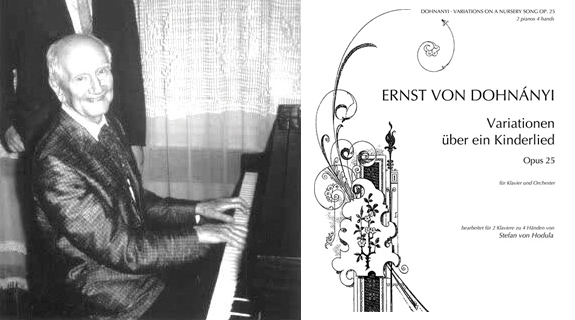Composed 1935; 30 minutes
Though just five years older than Bartók and Kodály, Dohnányi’s early success made him the senior member of the trio. Together, these three composers laid the groundwork for 20th century Hungarian musical life. Dohnányi held positions as director of the Franz Liszt Academy of Music, Music Director of Hungarian Radio and chief conductor of the Budapest Philharmonic. As a teacher, he helped train a generation of great musicians, including Annie Fischer, Georg Solti and Géza Anda, not to forget his grandson, conductor Christoph von Dohnányi. In addition, shortly after he published his Op. 1, the first of his two piano quintets, his appearances as a pianist in Germany and Britain established him as the greatest Hungarian pianist since Liszt. His international career as a pianist followed a roller coaster pattern, often sinking for political reasons. But Dohnányi did substantially broaden the repertoire. He added neglected works by the great Viennese composers, performing cycles of the complete Beethoven sonatas in 1920 and the complete Mozart piano concertos two decades later. He was also the first major pianist with an international career to feature chamber music on a regular basis. He did much to build Hungary’s musical culture through all his performing and administrative roles.
Dohnányi’s music, however, does not sound particularly Hungarian. Although intensely patriotic, he did not feel a need to find a musical identity through Hungarian folksong. Like Brahms, who was an early supporter of Dohnányi’s compositions, he looked to classical forms and traditional harmony, finding much that could be said, often in a quite innovative way, within the traditional genres of suite, symphony, sonata and the like. His Sextet from 1935 employs an unusual combination of instruments in a creative way, using two wind instruments (clarinet and horn) as a ‘wind section’ and three strings (violin, viola and cello) as a ‘string section,’ producing a quasi-orchestral sound from the outset. With sonorous piano chords and rippling cello arpeggios, the horn presents a key theme that will drive the opening movement in an incisive, purposeful manner – and, in an indirect way, add coherence to the whole through thematic development and cross references. The anxiety and melancholy that prevail throughout the opening movement may reflect the serious thrombosis which caused Dohnányi to cut back on much of his crowded schedule in the mid-1930s. In fact, although he had been a prolific composer and was to live another quarter century, the Sextet was to become Dohnányi’s final major chamber work. Performance, administration and teaching became his prime activities from 1949 on, once he started a new life (already in his seventies) in the United States.
The second movement, Intermezzo, juxtaposes a relaxed, lyrical opening with a more urgent funeral march which builds in intensity until passing and returning to the opening tranquility. The third movement is, essentially, a set of variations on a folk-like theme introduced by clarinet. Soon, the variations evolve into a spirited scherzo before a horn fanfare signals a return to the key theme from the opening movement. The finale, which follows without a break, is an eclectic romp through a variety of styles, in the spirit of Poulenc or Milhaud perhaps, always with a whimsical smile, with polished craftsmanship and a parting sense of humor.

Erno Dohnányi, still playing in 1959, aged 82. Four years later, he was to die while visiting New York for a recording session. Dohnányi’s most popular work is for piano and orchestra, titled Variations on a Nursery Song (1914). Dohnányi dedicated these witty variations on Twinkle, Twinkle, Little Star: “To the enjoyment of lovers of humor, and to the annoyance of others.” YouTubers can hear the veteran pianist in top form playing this piece at 79 years young, with Sir Adrian Boult conducting the Royal Philharmonic.
— Program notes copyright © 2024 Keith Horner. Comments welcomed: khnotes@sympatico.ca